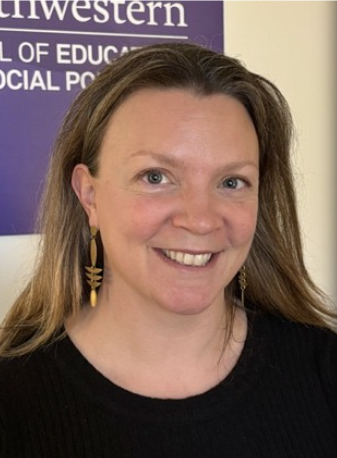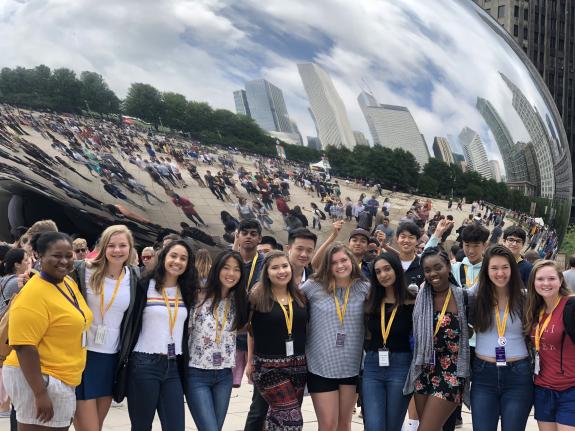From the Classroom to the Community: Building Leadership through the Lens of Service
By Ed Finkel
Before she became curriculum coordinator for CTD’s Civic Education Project a few months ago, Sarah Zaharoff embarked upon an 18-year journey that was both professionally and geographically variegated.
 Starting with a position in the federal government’s Teach for America program, Zaharoff has taught special education, science, math; served as a math specialist, reading specialist, instructional designer and instructional coach; and most recently had been an adjunct instructor for both undergrad and graduate students at University of Illinois-Chicago. Along the way, she’s been based variously in New York City, Chicago, Washington, D.C., and Evanston, as well as Ecuador and Cape Town, South Africa.
Starting with a position in the federal government’s Teach for America program, Zaharoff has taught special education, science, math; served as a math specialist, reading specialist, instructional designer and instructional coach; and most recently had been an adjunct instructor for both undergrad and graduate students at University of Illinois-Chicago. Along the way, she’s been based variously in New York City, Chicago, Washington, D.C., and Evanston, as well as Ecuador and Cape Town, South Africa.
“My family’s like, ‘Now you live in the suburbs, and you, like, have a minivan?’ I was like, ‘Yeah, it’s happening,’ ” Zaharoff jokes.
Although she is no doubt drawing upon all facets of her broad-based background, Zaharoff’s work in social justice, leadership and community building, which has occurred “in every building I’ve been in” is perhaps most germane to her new role. “That’s been at the heart of the work I’m doing,” she says.
“I am thrilled that we have this captive audience of super-bright kids that we can get to ask, not just, ‘How can I be better at math or reading?’, but also, ‘What can I do to give back and to deepen my connection to community?’"...This is also why Zaharoff has been in communication with Northwestern faculty and staff, connecting the work of CTD with how the University prepares leaders for the future.
The Civic Education Project currently offers four leadership and service-learning programs for middle- and high-school students—including two academic summer camp programs, an online experience and a weekend enrichment course—to develop the skills, awareness and exposure needed to bring about community-driven, positive changes in society.
In her role, Zaharoff says she’s excited to be focused on developing coursework for students with an interest—which she passionately shares—on how to be of service to others. “And I am thrilled that we have this captive audience of super-bright kids that we can get to ask, not just, ‘How can I be better at math or reading?’, but also, ‘What can I do to give back and to deepen my connection to community?’ And to start thinking about that as a pathway for their career and future.” This is also why Zaharoff has been in communication with Northwestern faculty and staff, connecting the work of CTD with how the University prepares leaders for the future.
 “We’re focusing on making sure that the work is place-based, that it’s rooted in people’s local communities, and that students have a chance to work with authentic audiences and do authentic tasks … focused on giving students agency, and tools to engage in civic life and in social change.”
“We’re focusing on making sure that the work is place-based, that it’s rooted in people’s local communities, and that students have a chance to work with authentic audiences and do authentic tasks … focused on giving students agency, and tools to engage in civic life and in social change.”
Another opportunity that Zaharoff hopes to pursue in the next year or so is opening pathways for elementary-aged students to participate in similar experiences. “Instead of just offering the intensive summer courses to our high schoolers, or online classes, we want to start integrating that into a lot of the classes for younger students,” she says. “That’s the dream.”
For students of any age to attain leadership skills, Zaharoff believes they need to self-reflect and ask themselves hard questions that go beyond how they’re going to “ace” a class or otherwise “get ahead” in life. “What am I going to do? And who am I? And how does that fit into a leadership model?” she says. CEP attempts “to give students different visions of how they could be of service. There’s direct service, there’s grassroots organizing, [and] there’s policy work.”
By prompting students to reflect on their experiences and goals, she adds, they envision their optimal pathways to leadership. “It doesn’t have to look the same for all students, and we want them to integrate both self-reflection and being exposed to different models of change.”

